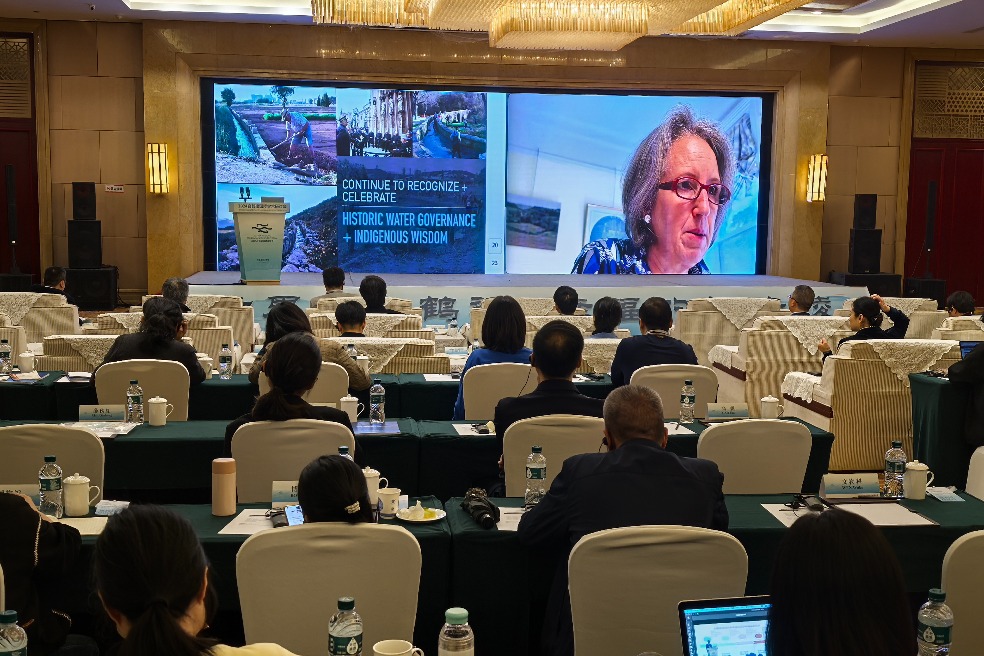Top physicist in insulator studies hailed
Researcher who has 'contradictory traits existing in harmony' praised for diligence

Tales of Chinese physicist Xue Qikun in the words of his students and colleagues conjure up distinct personas.
There is the amiable researcher who often brings milk and snacks to share with laboratory workers pulling all-nighters, and there's the formidable instructor with a laser-sharp eye for details and a short temper for slackers.
The 61-year-old emphasizes adhering to email etiquette and showing respect for senior scholars, but at the same time revels in assailing orthodoxy and is never afraid of putting forward unconventional propositions.
"He embodies so many contradictory traits that surprisingly exist in harmony in himself," said Wang Yayu, a professor in the Department of Physics at Tsinghua University and a longtime collaborator.
It seems only fitting that the material that Xue has spent more than a decade tinkering with — insulators that conduct electricity on the surface but insulate the interior — also carries opposite properties.
On Monday, Xue, president of Southern University of Science and Technology in Shenzhen, Guangdong province, was presented with the State Preeminent Science and Technology Award, China's top science award.
Also a professor at Tsinghua University and an academician at the Chinese Academy of Sciences, Xue led a team in 2012 to introduce magnetism into an insulator and observed an anomalous effect in the material. The discovery was published in the journal Science in early 2013 and recognized as a "milestone" and "one of the most awaited effects" by reviewers.
In his search, Xue said that his team made over 1,000 samples of thin insulators within four years.
"It would take about three to four days to finish preparing and measuring a single sample, so our team members together were deeply committed to completing such a massive workload," he said.
Despite varying descriptions of Xue, his coworkers were unanimously impressed by his diligence, perseverance and optimism.
Born and raised in a mountainous region in Shandong province in 1963, Xue said he considered himself "proficient in science since high school" but had only been an average student in college.
He failed the graduate program entrance exam twice before being admitted to the Institute of Physics at the Chinese Academy of Sciences in 1987.
"I think my upbringing in a remote region nestled in hills toughened me up and propelled me to pursue a goal relentlessly," he said last week. "Confronting failure, I am always able to reset and quickly engage in the next step."
In the 1990s, Xue received doctoral training and carried out research in China, as well as at Tohoku University in Japan and the University of North Carolina in the United States, during which he honed his laboratory skills and internalized a rigorous attitude toward science.
One of the most difficult moments that Xue often recounts to his students was when he was stuck during an experiment that involved using a scanning microscope to take an image of a flat surface of a semiconductor at the level of the atom.
"He compared his exertion to the desperation of getting lost at sea and gazing toward the blank horizon, with no sight of an island," said He Ke, a physics professor at Tsinghua University and a member of Xue's team.
"It was not until half a year later that Xue said he finally spotted a beautiful, clear image of the atomic arrangement of the material, and experienced a sense of joy like a castaway seeing a piece of land. Xue used his experience to encourage us to persist when encountering a hurdle."
Xue returned to China in 1999 and began working at Tsinghua University in 2005, where he stuck to a habit of clocking in at 7 am and not leaving until 11 pm.
Feng Xiao, an associate professor at Tsinghua University and a team member, said that creating and growing samples requires balancing a variety of parameters at the atomic level.
"Xue always requires us to pursue perfection and pay attention to the slightest details," she said. "When handling the extremely complicated and large equipment in our lab, Xue said that we should aim for utmost precision to the extent that experimenting with them is as easy as riding a bicycle on campus."
There is nothing that could enrage Xue more than seeing lab personnel wasting time or resources, Feng said.
A story circulated among his students about Xue severely chastising a student who idled around and browsed the internet for fun in the laboratory. "We understood that he was in pain at that moment, because when Xue was our age, he had no access to advanced equipment so he couldn't bear a waste of precious resources," she said.
With the increasing scientific and technological prowess of China, Xue said that as a Chinese scientist he feels a responsibility to present the highest quality data and research outcomes to the world and advance science together with global researchers.
"I am often asked where I draw my strength from and how I maintain my passion," Xue said. "That's actually very easy for me. I am already grateful for being born into a great time that values and fosters innovation. Just by looking back at how far we've come, I feel inspired to keep going."
- Taiwan trade barriers investigated
- Sayram Lake explores clean energy to better ecological environment
- Xi congratulates Taye Atske Selassie on taking office as Ethiopian president
- Chongqing, Cairo plan to pursue joint UNSCO recognition
- Overturned fire truck kills 5 in Pingli
- Chinese mainland experts condemn Taiwan leader's fallacy



































